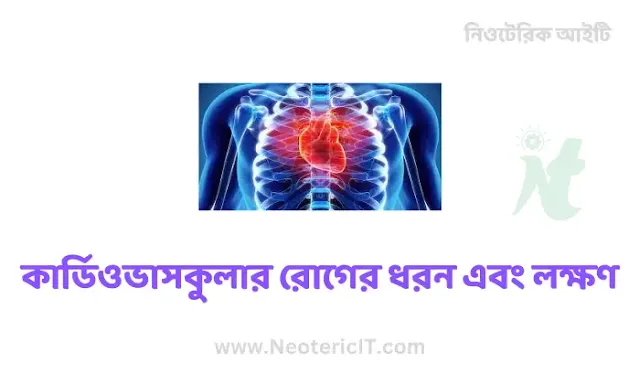Types and symptoms of cardiovascular disease
Hello dear guest - Welcome to Neoteric IT . You have come to Neoteric IT for information about Types and symptoms of cardiovascular disease Today I will conclude this article by discussing Types and symptoms of cardiovascular disease in detail. Search Google to know more about Types and symptoms of cardiovascular disease write Types and symptoms of cardiovascular disease or click here insightflowblog.com for visit. See the page Table of content for know the main topic of this article. Web story and AMP Version
Cardiovascular disease (CVD) is a broad term that encompasses a variety of conditions affecting the heart and blood vessels. Some of the more common types of CVD include coronary artery disease, heart failure, hypertension (high blood pressure), and stroke.
Coronary artery disease (CAD) is a condition in which the blood vessels that supply blood to the heart become narrowed or blocked. It can cause chest pain or discomfort, also known as angina, as well as shortness of breath, fatigue, and a feeling of tightness or pressure in the chest. A heart attack can occur if a blood clot forms and completely blocks a narrowed artery. Heart attack symptoms include chest pain or discomfort, upper body pain, shortness of breath, and cold sweats.
Heart failure, also known as congestive heart failure, occurs when the heart cannot pump enough blood to meet the body's needs. It can be caused by various conditions including CAD and high blood pressure. Symptoms of heart failure include shortness of breath, fatigue, and swelling of the feet and ankles.
High blood pressure or high blood pressure occurs when the force of the blood against the artery walls is too high. It can damage blood vessels and increase the risk of heart attack, stroke and kidney disease. Symptoms of high blood pressure may not be present, but when they are, they can include headaches, blurred vision, and ringing in the ears.
A stroke occurs when the blood supply to the brain is cut off, resulting in brain damage. It can be caused by a blood clot in an artery (ischemic stroke) or a blood vessel in the brain bursting (hemorrhagic stroke). Symptoms of a stroke may include sudden weakness or numbness in the face, arms, or legs, difficulty speaking or understanding, and loss of vision in one or both eyes.
Other less common but still important cardiovascular diseases include rheumatic heart disease, aortic aneurysm, and peripheral artery disease.
Rheumatic heart disease, caused by untreated strep throat, leads to heart valve damage and can cause heart arrhythmias, fatigue, and shortness of breath.
Aortic aneurysms can cause swelling or ballooning of the aortic wall, chest or back pain, and in some cases rupture.
Peripheral artery disease, a narrowed or blocked artery in the legs, can cause cramping in the leg muscles when walking or climbing stairs, pain and weakness, and in some cases, non-healing sores or ulcers.
It's important to remember that many people with CVD have no or only mild symptoms, which is why it's important to have regular check-ups with a healthcare provider and manage risk factors such as high blood pressure, high cholesterol, and smoking. . If you have any of the symptoms described above or are concerned about your risk for CVD, it is important to talk to your healthcare provider.
Thanks for read the post. You can also read the article in bangla - types-and-symptoms-of-cardiovascular
You are indeed a valued reader of Neoteric IT. Thank you so much for reading Types and symptoms of cardiovascular disease article. Please let us know how you feel after reading this article.

 Follow Google News to get the latest Neoteric IT news
Follow Google News to get the latest Neoteric IT news 
.png)





Please comment in accordance with the policy - otherwise your comments will not be accepted.
comment url